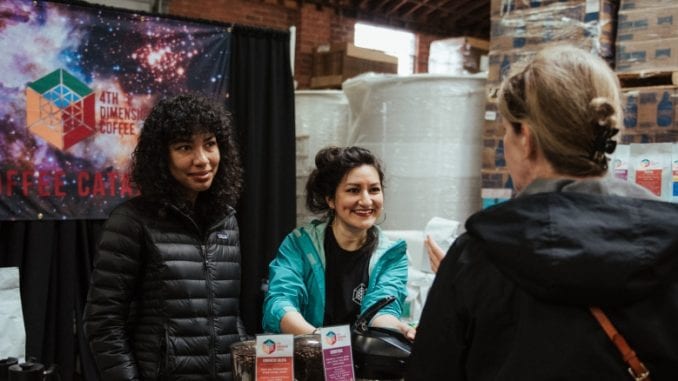
In its second year, the POUR Coffee Festival in Charlotte, N.C., bridges the gap between consumers and coffee pros over delicious brews.
BY ANGIE TOOLE THOMPSON
SPECIAL TO BARISTA MAGAZINE
Photos by Elli McGuire
It was rainy and cold on Sunday, March 10, in Charlotte, N.C., but 875 of the area’s visitors and residents weren’t really looking to be outside anyhow. That day, Charlotte’s POUR Coffee Festival was held inside the warehouse at Lenny Boy Brewing Co.
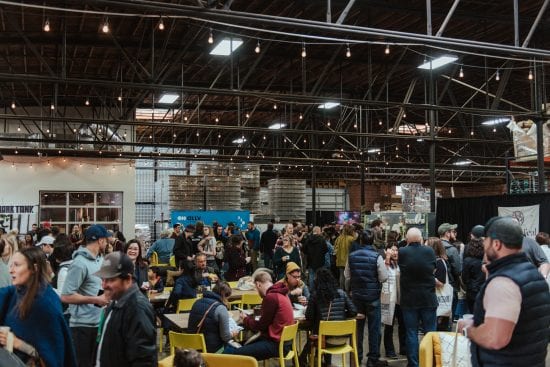
More than 20 vendors settled into the space that morning, warming up their brewing equipment, hugging the necks of old industry friends, and shaking hands with new ones. By the time the doors opened at 10 a.m., a line of coffee-curious folks had formed outside the brewery, ready to be handed a small mug for coffee tasting and led through the bright awning of cut-out paper coffee leaves.
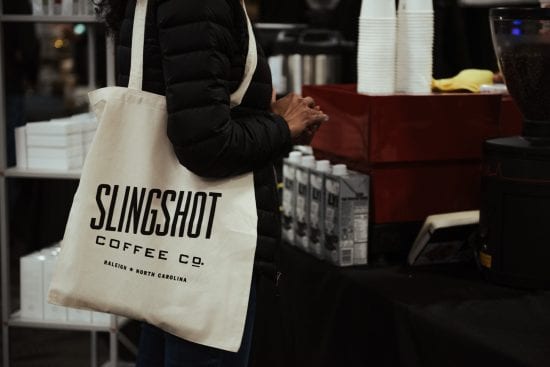
In its sophomore run, POUR nearly doubled in scale from last year’s event. In 2018, POUR debuted with nine roasters. This year, that number bumped up to 13. “That’s not including two cold-brew companies, one tea, three food vendors,” POUR’s cofounder and organizer Diana Mnatsakanyan-Sapp explains. “A lot of [this year’s diversity] came from learning from last year.”
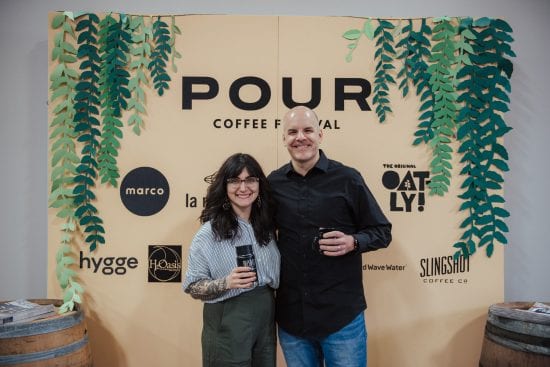
Following the first run of the event, Diana and her cofounder and collaborator, Matt Dudley of Marco Beverage Systems, sent surveys to attendees and vendors, asking for feedback. From that research, they fine-tuned this year’s festival with more food, opportunities for education, and inviting spaces to sit down and take it all in.
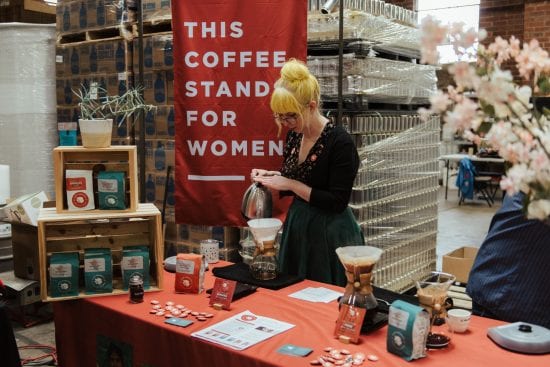
This same care and attention to the needs of the community—both consumers and industry folks—is part of what makes the POUR Coffee Festival special. The festival is public-facing, a welcome addition to the specialty-coffee event landscape, which typically caters to industry professionals alone. As Diana puts it, “There’s a disconnect” between the actual and perceived value of coffee. “If consumers aren’t being engaged meaningfully, if they aren’t being given the opportunity to learn, and if we aren’t elevating their experiences, we can’t expect them to understand the value of coffee,” she says.
The POUR Coffee Festival’s attendee base of mostly coffee consumers (about 70 percent) are able to taste coffee from myriad origins in succession and have access to coffee education in a down-to-earth setting.
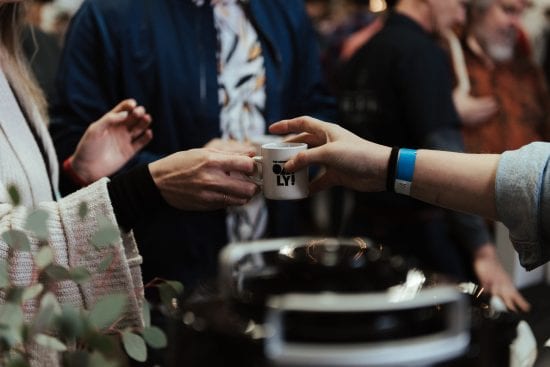
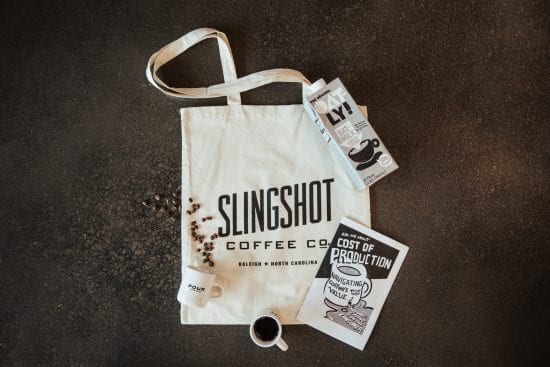
Consumers come to POUR to shake hands with the folks who roast their coffee, and the shoe is equally situated on the other foot, too. It’s not just baristas—who have the advantage of daily face time with customers—working the booths at POUR fest. Shop owners, wholesale reps, and roasters come out to gaze across the bar, for once, at the folks who drink their coffee.
People like the roaster from Black & White or the director of retail from Summit, the owner of Methodical or the wholesale rep for Pure Intentions. POUR affords them the valuable experience of talking face-to-face with coffee drinkers in the area, getting feedback in real time and gaining perspective through connection.
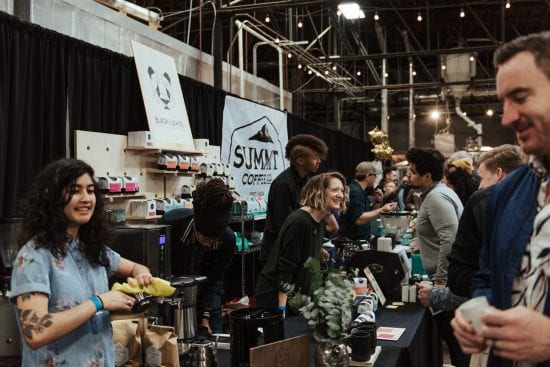
The bonds made at POUR, whether made in line for a 2oz pour of some of the finest brewed coffee in the Southeast or on the beautiful seating provided by Hygge Coworking, are ushering needed change into the specialty-coffee scene. The hope, Diana says, is that “over time we’ll see that people begin to shift their consuming habits from larger companies and mega-corporations to supporting small café businesses” through the connection of a person to a product. It’s those connections that Diana and Matt are fostering through their work with the festival. At the end of POUR Coffee Festival’s successful second year, it was easy to see the crucial role it has played in closing the divide between coffee worker and coffee consumer.
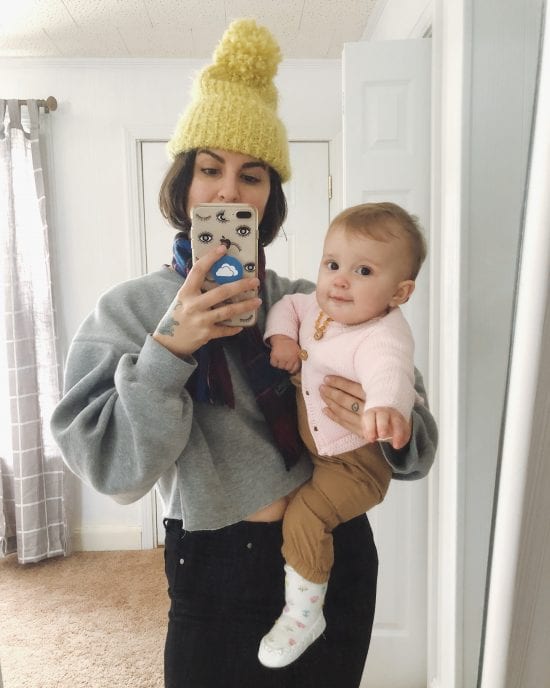
ABOUT THE AUTHOR
Angie Toole Thompson was voted “Most Talkative” in her eight-grade yearbook, and is the recipient of the “Ballin’ on Such An Eccentric Level” award, granted by one of her coffee-shop regulars. She is the quality control manager for Methodical Coffee, where they sometimes still let her work the bar.

